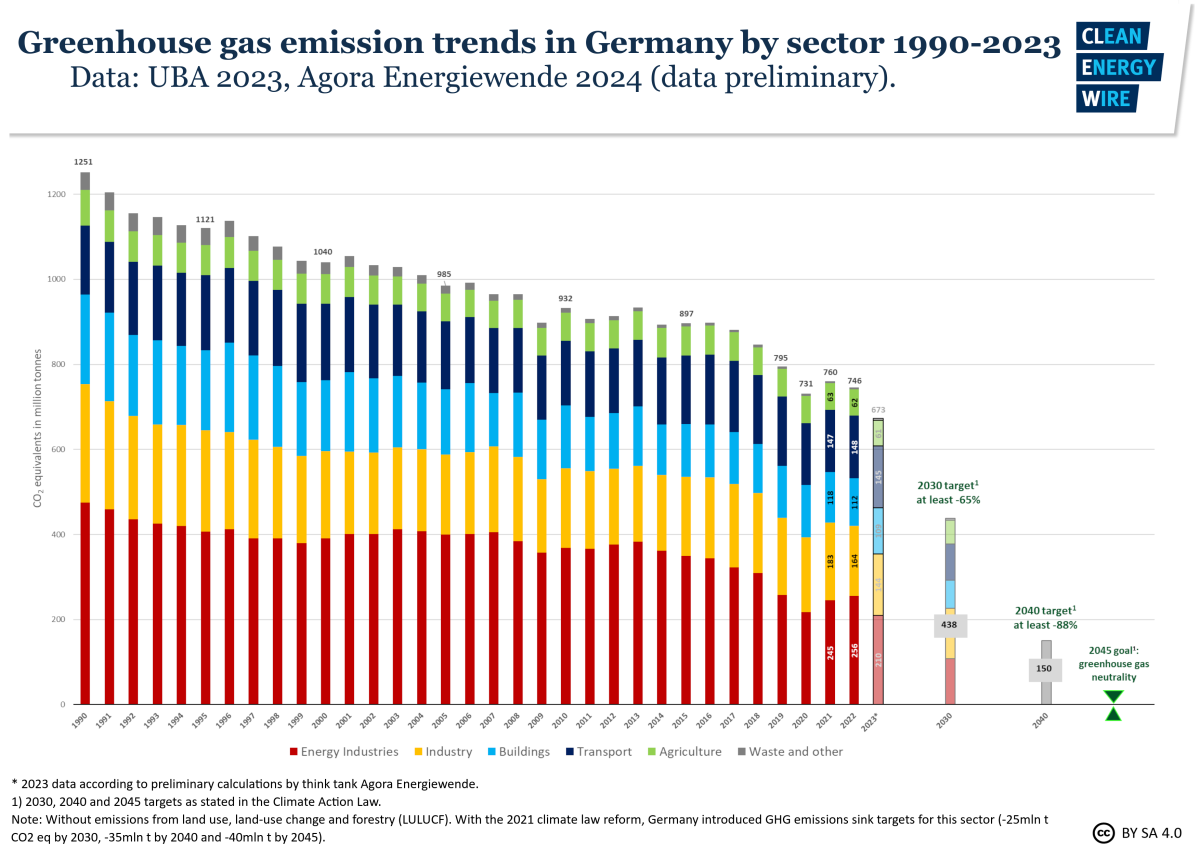Industry woes responsible for large part of emissions decrease
Both the think tank Agora Energiewende and minister Habeck emphasised that emissions reduction in industry had to be taken with a pinch of salt, even as the sector stayed below its CO2 limit laid out in Germany’s climate action law.
“The slump in production caused by the crisis is weakening Germany as an industrial centre,” said Agora’s Simon Müller. “If emissions are merely shifted abroad as a result, nothing will be gained for the climate.”
The sector needed policymakers to provide the right regulatory framework so that companies could invest in Germany, for example in greenhouse gas neutral steel production, or the switch to electricity for process heat.
Minister Habeck said that government’s goal was to ensure that Germany remained a strong industry location while becoming climate neutral.
“It is not good that the Russian war of aggression against Ukraine and the price crisis […] are leading to a decline in production,” he said.
Agora Energiewende said that continuously high prices in the European gas market due to the switch from cheap Russian pipeline gas to more LNG imports are an important factor for the slump in industry production.
Transport and buildings again fail sector climate targets
CO₂ emissions in the transport and building sectors stagnated again in 2023, meaning that these sectors continue to miss their climate targets, said Agora Energiewende.
The buildings sector exceeded its annual emissions budget for the fourth year in a row, as emissions decreased a mere three million tonnes of CO2, as households continued to save energy and heating needs were comparatively low due to mild temperatures.
After years of neglect regarding climate action in the sector, about half of German households still heat with fossil gas, and another quarter with oil. Following months of public wrangling and contentious debates, the government coalition in 2023 agreed a new building energy law to slowly phase out fossil fuel heating systems.
“Now that the political course has been set with the new heating law and the law for municipal heat planning, it is important to implement it consistently. This is the only way to finally effectively reduce emissions in the building sector,” said Agora’s Müller.
Transport repeatedly has been labelled the “problem child” of Germany’s energy transition, as emissions in the sector remained largely unchanged from 1990, with the exception of a significant drop in mobility-related emissions during the coronavirus pandemic.
The sector failed its 2022 climate target, and as the government failed to deliver proposals to get it back on track, a court ruled the transport ministry would have to come up with a set of immediate measures.
Now, the sector looks to have exceeded its annual emissions budget for the third time in a row in 2023.
“As far as transport is concerned, we know that we have a problem and that more is needed here,” said economy minister Habeck.
Agora Energiewende called for a coherent and comprehensive concept to transform the sector, including adjusting taxes, levies and subsidies relating to cars, securing the expansion of local public transport and making it easier for local authorities to implement the transport transition through modern road traffic legislation.
The think tank also said that the government’s target to have at least 15 million electric cars on the roads by 2030 “remains a long way off.” As in the previous year, the share of electric cars among new registrations in 2023 remained unchanged at just under 20 percent.
German transport and environmental association Verkehrsclub Deutschland (VCD) called on the government to “finally introduce effective measures.”
It proposed to align transport taxes and levies with climate efforts, for example by increasing the energy tax on diesel fuel, but also more immediate measures such as a speed limit on motorways.
Government must secure sustainable emissions reduction – NGOs
The crisis in parts of the economy must not be confused with successful climate policy, said Clara Thompson, mobility officer at NGO Greenpeace Germany.
She argued that only a fraction of the significant reduction in emissions was achieved by reducing energy consumption and expanding renewables. “The emissions figures are therefore primarily a political call for action to make the reduction sustainable,” she said.
Environment Action Germany (DUH) criticised the “catastrophic” emissions figures in the transport and building sectors.
Managing director Jürgen Resch said that speed limits on motorways, and lower speeds on country roads and in cities could almost completely make up for the gap towards reaching the transport sector climate target last year.
Clean Energy Wire











